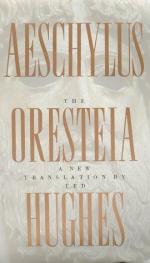|
This section contains 2,600 words (approx. 9 pages at 300 words per page) |

|
SOURCE: "Ted Hughes In and Out of Time: Remains of Elmet and Moortown Elegies," in World, Self, Poem: Essays on Contemporary Poetry from the "Jubilation of Poets," edited by Leonard M. Trawick, Kent State University, 1990, pp. 37-43.
[In the following essay, Brandes asserts that Hughes's poetry remains out of time and history.]
In 1957, at the outset of his career, Ted Hughes asserted that his poems exist because "they are the only way I can unburden myself of that excess which, for their part, bulls in June bellow away." Hughes's bulls represent his early attempt to claim an imaginative territory outside the ironic understatement and domestic preoccupations of the mainstream of British poetry represented by the Movement in the late 1950s. Although one must take the young Hughes's excessive bulls with a tolerant grin, one must also see the bovine analogy as his attempt not only to distance himself...
|
This section contains 2,600 words (approx. 9 pages at 300 words per page) |

|


